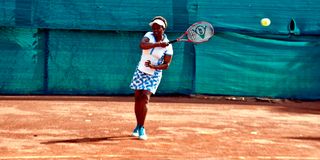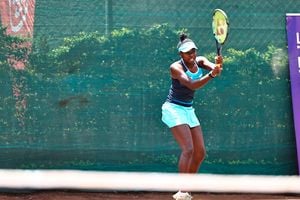
Mary Wachira, 62, trains at the Nairobi Club court on October 25, 2024.
As the W35 ITF Women's World Tennis Tour got underway in Nairobi on Monday one player stood out among the competitors.
At 62 years, Mary Wachira entered the women’s tennis professional event, capturing the attention of fans.
The sexagenarian is not just active on tennis courts, she is also into bowling, golf, and pickleball, playing all competitively. She enjoys jogging, walking, and dancing.
“For me, sport is a lifestyle hobby. I do these sports for health purposes. They reduce stress, help in mental alertness, keep diseases away, and assist in weight management,” explains Mary, who started playing tennis at 30.
The multi-talented mother of two says her love for sport is also for social interaction, fun, and enjoyment of a strong quality of life.
“I like the challenge of competition, exploring my potential and inspiring and motivating all generations,” says Mary.
Born in Nyeri County, she attended primary schools in Nyeri, Meru, and Nairobi before doing her O-Levels at Precious Blood Riruta where she was a winger in field hockey.
She dropped hockey in Form Four and then took up tennis. “When I started playing tennis, I used to get blisters in my hand. I thought the solution was to put on gloves which I used for between six months and one year. It looked odd. Other players used to laugh at me for wearing gloves and made jokes which offended me. I was thinking about my beauty at the time, but finally, I was able to get rid of the gloves,” she said.
Mary worked as a cashier at Kenya Power for three years almost immediately after graduating high school in 1980 and later on at Copy Cat for 10 years. During her time at Kenya Power, she competed in sprints and shot put in interbank and inter-branch competitions in Nairobi.

Mary Wachira, 62, trains at the Nairobi Club court on October 25, 2024.
“I found a passion for tennis in 1993. And as we went for our lunch after church on Sundays, we could come to the Public Service Club in Upper Hill. And after our lunch, we didn't know what to do next. So from there, we saw other people playing tennis at the club and we joined the competition as a family. We all started with my two children and my husband. But along the way, they split and went to other sports,” explains Mary, who was coached by Peter Wachira at the beginning of her tennis life. They share names but are not related.
Mary, a trained secretary and business administrator, noted that there were many competitions when she started playing tennis, including the Nairobi Open, the Kenya Open, and the Parklands Open.
“I never went far with tennis, but participating in nearly every tournament was the key thing for me,” said Mary, who is now the main person in the veterans’ tournaments in the country.She still competes against players three times younger than her and won a few games against Roselida Asumwa in the W15 Nairobi in 2019 at Peponi School, and Indian Sharanya Shetty as well as Stacy Yego in W15 Nairobi in 2022 at Karen Country Club.
She won a game against Cheruto Wanjala at the 2024 Kenya Open at Nairobi Club. Wanjala,19, Asumwa,20, and Yego, 16, are some of the top players in the national team.
At 62, why not go into coaching? Mary says that she has been resilient in just playing the game. “I did a coaching course in 2020, but COVID came and there wasn't much going on.
But even then, I tried a bit, but I felt my passion was in participating than in coaching. I find it fulfilling walking along with the players in tennis,” stresses Mary.
She continued: “Once you get to know how to play the game, I can say you are automatically hooked. Nobody pressures you to go and play. It just comes automatically.”
Mary explained that she has picked some valuable lessons from tennis, including resilience, keeping your goal, and being focused. “If I say today I'm going to play tennis, then I'll be there no matter what unless an emergency arises,” observes Mary.
She used to have three training sessions in tennis a week before she added more sports. “And it was like religiously on Wednesday, Friday, and Sunday from 4.30pm.
But with the introduction of more games now, I'm trying to spread out. However, I make sure tennis gets two days, whatever the case,” says Mary who is now doing two and a half years of golf.
Mary went a bit slow on tennis for about six months after hurting her knee in August last year in a mini tennis competition which has been keeping veterans going because they don't have many major competitions.
“That's the only time I've ever taken a break from tennis. Six months because of my knee,” stressed Mary. While nursing the knee injury, that is the time she added bowling to the roster of sports she does.
Considering that tennis and bowling are at Nairobi Club, Mary would still come and see how tennis players at the club were doing as her knee healed.
Six months ago, Mary took up pickleball which is one of the fastest-growing sports in the world. “I took up pickleball because of the rain. I mean it could rain here at Nairobi Club and not rain in another part of the city. I said to myself that I could try pickleball which is played on a kind of hard court, so even if it rains, the surface can be mopped, and you can still play. And you also can play at night. So that's how I have added my other sports and a little dancing along the way,” observes Mary.
Her tennis sessions start at 4.30pm. “So, basically I have the whole morning to myself, to do family matters,” explains Mary on how she juggles the many sports she does and life outside sport, noting that for golf she plays a little earlier in the day because it takes more time on the course, a minimum of four hours.
What is the secret to her longevity in tennis? She has been in the sport for more than 30 years now.
“Let me first thank God, because it's only last year that I took a break of six months. I had never had an injury before last year. So that is what kept me. I didn't have an excuse not to do it because I had no injury. Maybe, family commitments can come on the way sometimes. But being in a family of sportspeople, it's all accommodated, whatever is happening,” explains Mary, who has been the lady captain for the Nairobi Club tennis section since 2014.
At her age, you would expect Mary to be looking a little older than she is. She says the sports have kept her going strong. She also teams up with Karura Tennis Club for Karura Tennis Ladder, an avenue for players in search of playing competitive matches around their busy schedule and connecting with other tennis players.
“Last year I didn't play Karura Tennis Ladder, but this year I played and now I'm number six on the ladder from a list of more than 30 people. You start at the bottom and you work your way up by playing the people there. It's a flexible kind of game because also when you are challenged by somebody and agree on the group, from there, between the two of you, you arrange the time, you arrange where to play it. So it's convenient for you,” says Mary.
Her husband is a golfer, and her daughter swam in high school. Mary's son was more into basketball. “He was a captain at the University of Cape Town. But for some time, he had to drop out from sports after an injury to his left arm in a motorbike race,” says Mary about his son.
She stressed that all the sports she does are important for friendship, keeping fit, and having a worthwhile life. “You keep the doctor away through this kind of sport. God willing, I would like to play these sports in my 80s,” notes Mary.
She says dancing salsa helps her with footwork and golf is good for fitness. “We walk like eight kilometres on the golf course.
This helps you to be fit in your sport. Being good at your footwork reduces the chances of getting injuries whenever you're playing. The sports I do are all interrelated. They complement each other. And I can say there is no sport which is better than the other. Every sport has its advantages,” says Mary, always with her trademark small bag carrying water and juice. “I always go with them wherever I go, whatever sport because it's good to keep hydrated,” observes Mary.
She says juggling sports is not cheap. Giving an example of tennis, Mary says would rather miss lunch, but not miss playing.
“What makes it expensive is that you have to play in a club. So you have to be a member of a certain club. As for tennis, the racket is expensive. A good racket will not go for less than Sh15,000,” says Mary. Whenever you play in a club, you spend not less than Sh500 to play a game. “In fact, in most clubs, you will pay Sh500 an hour,” she says. And this you have not included the cost of buying the tennis balls, which depending on how hard you hit them, wear out very quickly. You also need to train or play with a person. “You cannot play alone. You have to have a partner. So it means you cannot go it alone,” notes Mary.
She says she was lucky when she started tennis at Public Service Club to train against the Rogois and the Ilakos, even the current Tennis Kenya president James Kenani.
Her role model was former Kenya Open champion Evelyn Otula who represented Kenya in many international competitions including the 2007 and 2011 African Games. “Evelyn Otula was my role model. She put her foot forward. The other girls did try, Caroline Oduor and Veronica Osogo,” noted Mary.
Her assessment of tennis players in Kenya is that they seem to disappear when they get to their 20s.
“The only challenge I find is when they get 18, then either they go out of the country, which is a good thing, or they're sponsored out of the country, it's still a good thing. But then we don't have players in their 20s. They've gone abroad since most of the competitions locally are for juniors under 18. There are no senior competitions that they are after. I think we have no platform for progress, I suppose. That's why I feel probably we should have more tournaments. We could keep them here,” observes Mary.









